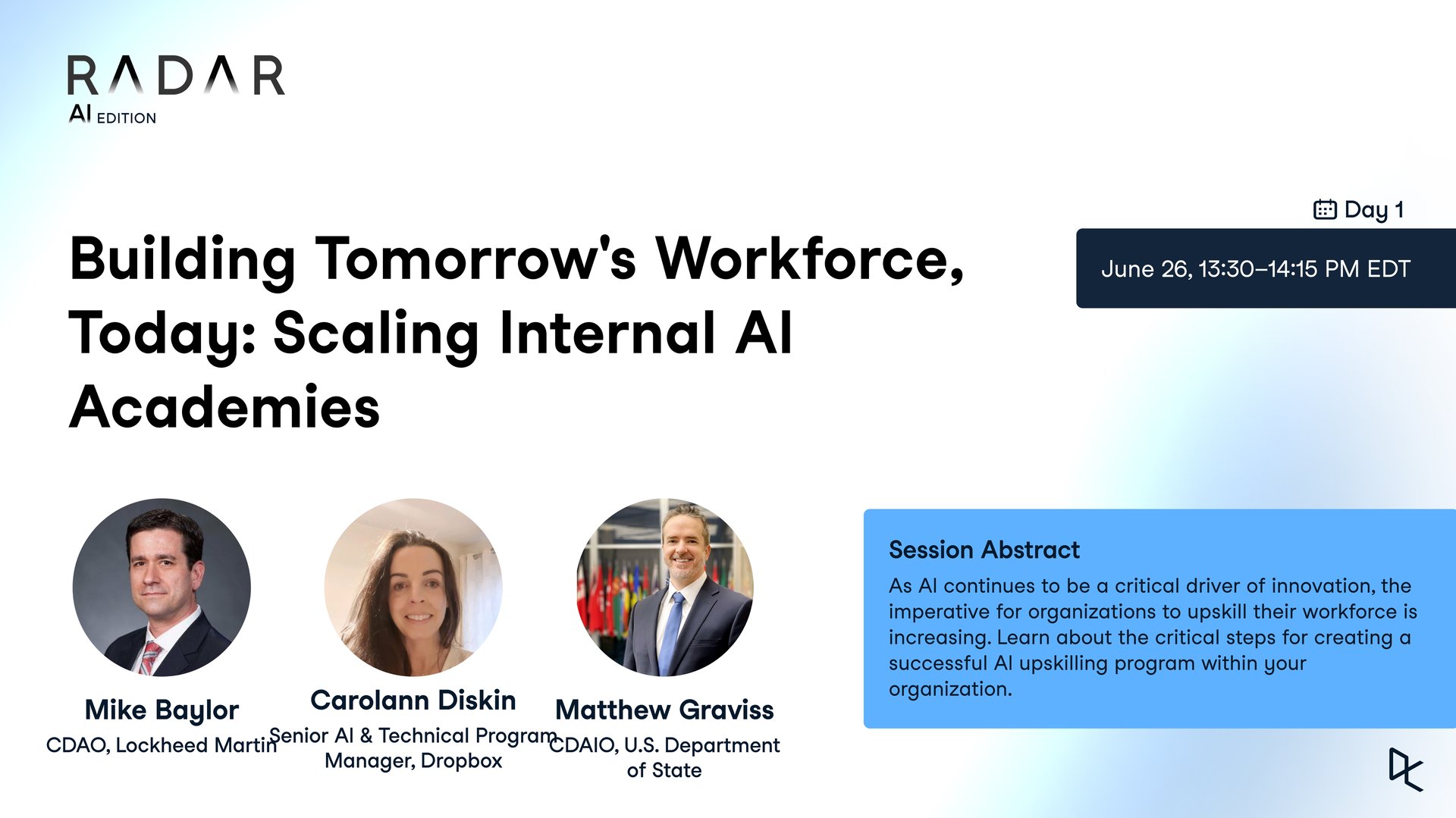Speakers
Training 2 or more people?
Get your team access to the full DataCamp library, with centralized reporting, assignments, projects and moreBuilding Tomorrow's Workforce, Today: Scaling Internal AI Academies
July 2024
Summary
Adopting AI technology involves more than just acquiring tools; it entails a comprehensive upskilling and reskilling of employees to effectively integrate AI into their work. The webinar underscores the significance of AI training in organizations and explores various methods to implement successful AI training programs. Featured speakers from Lockheed Martin, Dropbox, and the U.S. Department of State share insights on the reasoning behind AI training, its objectives, and the intended audience for such initiatives. They discuss the challenges of maintaining employee interest in training and identify internal advocates to encourage AI learning within organizations. Beyond the technical understanding, the training also aims to empower employees to innovate and apply AI in their respective roles for improved productivity and creativity.
Key Takeaways:
- AI training is important for all employees, not just technical staff, to understand both the capabilities and limitations of AI.
- Effective AI training programs require a mix of practical, theoretical, and self-paced learning options.
- Interest and motivation are vital for sustaining participation in AI training programs.
- Internal advocates play a key role in promoting AI training and sharing success stories within organizations.
- AI training can result in significant productivity increases and career advancements for employees.
Deep Dives
The Importance of AI Training Across All Levels
AI is transforming industries, making it necessary for organizations to equip their workforce with a firm understanding of AI principles and applications. As ...
Read More
Hurdles in Implementing AI Training Programs
Implementing AI training programs comes with its set of challenges, particularly in maintaining employee interest. Mike Baylor, Chief Digital and AI Officer at Lockheed Martin, emphasizes that while initial adoption might be driven by enthusiastic early users, maintaining interest requires careful program design that aligns with employees' job goals. Programs must be adjusted to provide relevant and practical training, enabling employees to see the value of AI in their specific roles. Organizations like Dropbox use a diverse approach, including internal communications, leadership endorsements, and incentives such as swag and certificates, to promote and sustain interest in AI training.
The Role of Internal Advocates in Promoting AI Learning
Internal advocates are vital in building a culture of continuous learning and promoting AI training within organizations. These advocates, often passionate about AI, help spread excitement and knowledge across different teams. At Dropbox, advocates from various departments share their learning experiences and success stories, encouraging colleagues to engage in AI training. This peer-driven approach helps demystify AI and makes the learning process more relatable and accessible. According to Dr. Gio Altamirano-Reo from the Department of State, these advocates also play a vital role in identifying and addressing specific training needs, ensuring the program's relevance and impact.
Gauging the Impact and Value of AI Training
Assessing the return on investment (ROI) from AI training is important for justifying the costs and measuring its impact on organizational performance. As Mike Baylor explains, Lockheed Martin evaluates the overall value by considering both high-end AI engineers and the broader employee base, where aggregated improvements can surpass the impact of specialized roles. Success stories, such as the U.S. embassy in Tegucigalpa using AI to cut report writing time by 50%, demonstrate tangible productivity gains. These metrics help organizations understand the broader benefits of AI training, beyond immediate skill acquisition, in driving innovation and efficiency.


